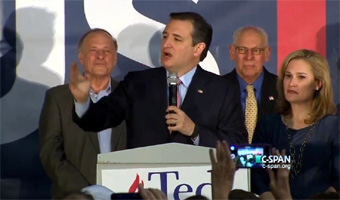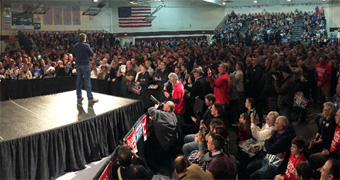
Image courtesy of C-Span
Iowa: Cruz Surprises Trump; Rubio Finishes in Strong 3rd Place
| published February 2, 2016 |
By R. Alan Clanton, Thursday Review editor
Amid record turnout for the Iowa caucuses—the first U.S. state to vote for would-be party nominees and the nation’s first real test of candidate strength—Texas Senator Ted Cruz pulled off a major win by besting businessman Donald Trump.
Hundreds of thousands of Iowans showed up for caucusing all across the Hawkeye state where in crowded gymnasiums, cafeterias, fellowship halls and meeting rooms they cast their votes for President, Republicans voters giving Cruz a 28% share of the vote, and nudging Hillary Clinton to victory in a razor-thin, narrow election between the former Secretary of State and her only remaining rival, Vermont Senator Bernie Sanders.
Clinton edged out Sanders by less than one half of one percent—one of the closest caucus results ever seen in Iowa (results from the 2012 GOP caucus were closer, when a careful recount showed that Rick Santorum beat Mitt Romney by 12 votes statewide).
Sanders and Clinton each claimed victory, though the outcome was, in effect, a virtual tie. Clinton only sealed the deal late into the night as scattered tallies finally came in from a few suburban precincts near Des Moines. Though Clinton maintained an ever-so-slight lead much of the night, Sanders at times edged past her, and the question of who would win—officially—remained largely unresolved until past midnight.
Iowa delivered a big win for Cruz, who comfortably bested Trump in a state in which some recent polls had shown the two candidates in a dead heat, while other polls showed Trump reclaiming his once indomitable lead. Florida Senator Marco Rubio claimed a victory of sorts also, pulling in a surprisingly strong third place finish which—in the end—very nearly overtook Trump’s numbers. Rubio and his staff had hoped for exactly that outcome—a compelling third place behind Trump and Cruz, which many political analysts believe was the most coveted prize of the night, and a restarting point where “traditional” and “establishment” conservatives could rally.
The results from Iowa had produced at least two casualties even before all the votes had been counted. Democrat Martin O’Malley, former governor of Maryland, suspended his campaign as it became apparent he would not pull in even one percent of the votes from Democrats statewide. O’Malley and his team had hoped for a surprise strong third place showing as a way to jumpstart his longshot candidacy in a race which had become, in effect, a two-way battle between front-runner Clinton and her chief rival Bernie Sanders.
Around 9:45 p.m., former Arkansas Governor Mike Huckabee also ended his campaign amid sinking poll numbers and a steady decrease in campaign contributions. Huckabee received about two percent of the vote in Iowa despite having spent countless hours campaigning in the Hawkeye State and despite his popularity and likeability among evangelical Republicans. In 2008, Huckabee had been the surprise winner in Iowa.
Cruz’s win was the biggest news of the night for Republicans. Cruz collected about 28% of the caucus vote statewide, with Trump pulling in 24%, and Rubio slightly over 23%. Although late returns from some stray areas showed a trend which might nudge Rubio past Trump, the final votes confirmed Trump’s second place showing, though only barely.
Retired neurosurgeon and author Dr. Ben Carson placed fourth, with about nine percent of the total vote. Kentucky Senator Rand Paul and former Florida Governor Jeb Bush placed fifth and sixth respectively, with four and three percent each. Former HP CEO Carly Fiorina, Ohio Governor John Kasich, New Jersey Governor Chris Christie, and former Pennsylvania Senator Rick Santorum all ended the night with two percent or less.
The night was disappointing for Bush, Fiorina, and Christie. Bush had at one time a year ago been the GOP’s de facto front runner, and the candidate with arguably the best fundraising machine among all Republicans. In the already crowded field, the former Florida Governor was raking-in more campaign cash than several of his closest rivals combined, and needed at the time—or so it seemed—merely the ability to push aside other mainstream candidates, such as Wisconsin’s Scott Walker and New Jersey’s Chris Christie. Bush saw his political capital sink, however, after the arrival to the field of the billionaire Trump, whose populist language energized a wide sector of the GOP voters and drew support away from many in the crowded field.
Christie, too, had once been viewed as the future of the party. The New Jersey Governor had been given a prime-time speaking slot at the 2012 Republican convention in Tampa, and was then already widely regarded as a potential front-runner for 2016. Christie, like Bush, also had a proven track record of outreach to Democrats, having won the governorship in a state dominated by Democrats. But Christie never fully recovered from the so-called Bridgegate affair, in which he was accused by some of helping or encouraging in a scheme to close lanes on the George Washington Bridge as a form of political retribution against a Ft. Lee, NJ mayor who refused to support Christie in his reelection bid in 2013. Several concurrent investigations and probes have failed to link the governor directly to the scandal, but a cloud has remained over Christie ever since.
Former HP CEO, despite a surge during the summer of 2015 in which she became one of several candidates able to draw support away from Trump, has also seen her support wane in recent months. Once able to claim a reliable second or third place in some national polls, and despite strong debate performances in August and September, Fiorina was unable to keep up her once-respectable numbers in Iowa—an important early test of strength.
All three candidates had seen better-than-expected debate performances as the late summer turned to fall and winter, but the constantly shifting field made it difficult for them to break out in a narrative often dominated by Trump, and later by Trump’s closest rival, Ted Cruz. All three have acknowledged weak support in Iowa but remain buoyant and optimistic about their chances in New Hampshire, where GOP voters tend to vote differently than their counterparts in Iowa. Bush and Christie especially may also be hopeful that South Carolina gives their candidacies a boost. Bush and Christie each had already left Iowa to begin an intensive week of campaigning in New Hampshire.

Photo courtesy of Ted Cruz for President
For Cruz, the victory in Iowa is substantial, and may prove to be even more useful in convincing previously skeptical Republican voters that his candidacy is the only remaining viable alternative to that of Trump. Trump still maintains a wide lead in New Hampshire, which holds its primary next Tuesday. Trump also holds onto a lead in national polls among Republicans, meaning that Cruz’s win—while critical and powerful—may be only the start of a long, possibly contentious fight for the GOP nomination.
Rubio, too, has claimed a moral victory; as the only non-anti-Washington candidate among the top four finishers, Rubio will no doubt seize the opportunity to urge mainstream Republicans and traditional Republicans to enter his fold. If Rubio can successfully make his campaign the rallying point for those anti-Trump, anti-Cruz elements among the GOP electorate in upcoming primaries and caucuses, the Florida Senator may be able to generate solid momentum through Super Tuesday and beyond, possibly even overtaking Cruz. Although he placed third in the crowded field, Rubio won outright five counties in Iowa, including Polk, Dallas and Story—Des Moines and its suburbs—and Scott County (Davenport), proving he can win in urban and suburban areas.
Rubio spoke first during the late evening, addressing an enthusiastic crowd and declaring a victory of sorts for his surprisingly strong third place showing. He thanked his supporters, his family, and the people of Iowa, and though he acknowledged his rival Ted Cruz (the night’s big winner), he did not mention Trump’s name. During his brief speech to supporters in Iowa, Rubio clearly exuded the mood of someone who had won, listing all the bullet points he frequently cites as the things people said to him when he first considered running for President.
“For months they told us we had no chance,” Rubio told the enthusiastic crowd. “For months they told us that because we didn’t have the right endorsements, or the right political connections, we had no chance. They told me we had no chance because…my hair wasn’t grey enough and my boots were too high [laughter and cheers from the crowd]. They told me I needed to wait my turn—that I needed to wait in line.”
Trump also spoke to a large crowd of enthusiastic supporters in Iowa. He thanked Cruz, acknowledged the other candidates, and thanked Huckabee—whom he called a friend—though he did not specifically mention Huckabee’s withdrawal from the race. Trump, who was generally gracious and offered none of his usual barbs or bombast, said he remains the front runner in most national polls and says he still plans to win big in New Hampshire and South Carolina. Trump told those watching that he still intends to win the GOP nomination, and joked of his love of Iowa by telling the audience “I might come here and buy a farm!” The real estate mogul made no mention of Marco Rubio, who had come to within one percentage point of taking second place.
Cruz declared a well-earned victory.
“God bless the great state of Iowa,” Cruz thundered as he stepped up to the podium in Des Moines. Cruz immediately placed the credit for his surprise win on a grass roots support and tireless organizers. He also declared that ideology played a role in his big win.
“Tonight is a victory for courageous conservatives across Iowa and all across this great nation,” Cruz said to cheers.
Political observers say that Cruz’s smashing surprise victory came as a direct result of formidable field operations and on-the-ground activities which surpassed that of any other candidate. Cruz spent about 57 full days in Iowa, more than other candidates, and his campaign team made sure that no part of the Hawkeye State went untouched by their message and outreach. Cruz also campaigned relentlessly, opting as much as possible to avoid getting drawn into a personality clash with Trump.
But for Cruz, the come-from-behind win may shatter the notion—only days ago seemingly inescapable for Republicans—that Trump may ultimately prevail and become the GOP nominee later this year. Many political analysts say that Trump’s loss to Cruz shows weakness in the billionaire’s genuine ability to convert crowd enthusiasm and populist language into real votes or tractionable political gains, and Cruz’s victory reveals that anti-establishment and anti-Washington fever, while still hot, may not easily flow by default to Trump.
Related Thursday Review articles:
Down to the Wire in Iowa; R. Alan Clanton; Thursday Review; February 1, 2016.
Iowa: The Art of Raising Lowered Expectations; Thursday Review editors; Thursday Review; January 31, 2016.
